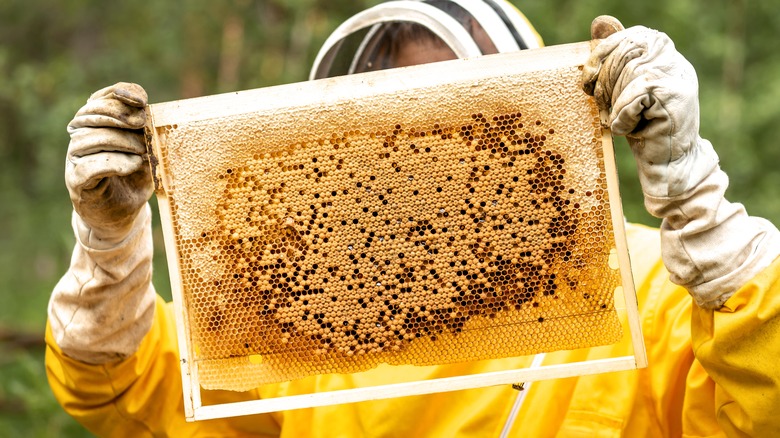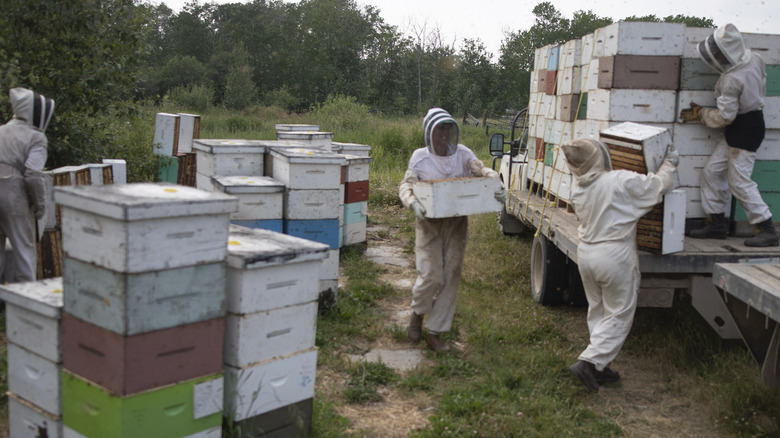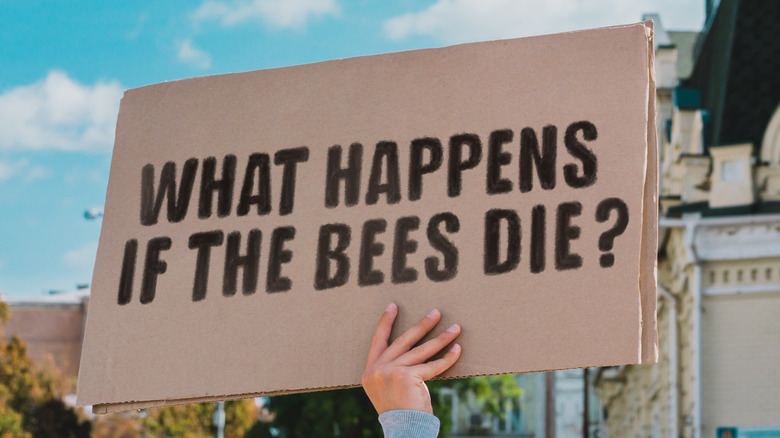Why You Need To Watch For Bee Products As An Ingredient If You're Vegan
If you're a vegan — a person who doesn't eat, wear, or use animal products — you already know to avoid meat, dairy, eggs, and fish. But other common non-vegan ingredients come from a much smaller animal: the bee. And although they're tiny, many vegans argue that the products of small animals are still animal products and therefore don't fit in a vegan lifestyle.
In the same way that cows produce milk or chickens produce eggs, bees produce honey. They fly from flower to flower, gathering nectar, then return to the hive where they spit up and pass down the nectar to other worker bees, breaking down the sugars until the nectar becomes honey (via Live Science). The bees then dry the honey with their wings before covering the honeycomb cell with beeswax. Beeswax is made from wax scales shed from the abdominal glands of the bee. When bees chew those scales with a bit of saliva, they create the building material for the hive, according to a 2019 study in the Journal of Apicultural Research. Bees also produce other commercially used substances, including propolis, royal jelly, and pollen.
Since bee products are made from animals, many vegans argue you must extend your circle of compassion to include the products of these insects. Here's their rationale why.
Bees, like large livestock, are commercially farmed animals
Just as with cows, pigs, chickens, fish, and other animals, bees are farmed on an industrial scale. Humans use them for their products and for their labor as large-scale crop pollinators. Because of this, bees play an integral role in worldwide food production. According to a 2021 study published in the scientific journal Insects, around 33% of the entire human food supply relies on bee pollination. Without bees, we wouldn't have many foods we love, including almonds and avocados.
Bees are shipped across the nation for pollination, and that travel takes an enormous toll on their health. A 2016 study in the journal Nature found that this constant movement raised the bees' levels of stress and adversely affected their health. The authors also found that bees used for crop pollination die sooner than wild bees. Vegans who hope to reduce animal suffering see this research as evidence of animal cruelty and an excellent reason to avoid bee products.
Bees die in the course of commercial farming
While bees don't have to die in order for humans to use their products, they can be accidentally or intentionally killed. The Vegan Society notes that entire hives of bees can be culled post-harvest in order to keep the farmer's costs down. Bees also die because of poor hive management. After a honey harvest, commercial farmers often replace nutrient-rich honey with high fructose corn syrup, which the bees must feed on during the winter months. One 2013 study in PNAS found that this replacement practice may weaken the bees' natural resilience to pathogens and pesticides. Without the immunity provided by honey, bees are threatened by colony collapse disorder –- the (thankfully now waning) phenomenon the EPA says happens when most of the female worker bees abandon the hive, leaving the queen and other drone bees to fend for themselves. Hives in this state rarely survive the winter. If colony collapse disorder gets worse, it could threaten food prices and availability.
Saying no to bee products is as much about caring for bees as it is about caring for the planet. If you're a vegan because you love animals, you might want to find just a little bit more room in your heart for these buzz-worthy creatures.


